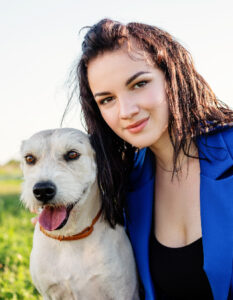Are you concerned with the change in your puppy’s eating and sleeping pattern recently? It is common for puppies to stop eating and start sleeping a lot due to stress and anxiety, health issues, or as a result of environmental distress.
Do not worry! With more than 7 years of experience in veterinary care, I am here to help you.
This article encompasses the reasons why your puppy not eating much and sleeping a lot. Additionally, some tricks and tips to solve or prevent the issue.

Reasons Why Puppy Not Eating Much and Sleeping a Lot
There can be many reasons why a puppy does not eat much and sleeps a lot. Take a quick look at the 10 most common reasons below.
1. Stress or Anxiety
Anxiety and stress can cause grave changes in your puppy’s overall well-being. Stress and anxiety can cause loss of appetite and excessive sleeping. One common reason for stress and anxiety is separation from the mother at an early age or separation from the owner.
Other factors that might trigger anxiety are confinements, negative reinforcement, changes in routine or environment, etc.
2. Stomach Upset and Digestive Issues
Our little puppies are yet to completely develop their digestive system. Any sudden dietary change and unprecedented food allergies can easily trigger digestive issues in puppies.
Additionally, feeding table scraps, and spoiled food trigger digestive upset. As a result, puppies may develop stomach issues such as gastritis, colitis, diarrhea, pancreatitis, gastroenteritis, intestinal blockages, and inflammatory bowel disease.
If your puppy is going through stomach upset and digestive issues, they may refuse to eat at the same time increase their sleeping hours.
3. Dental Problems & Teething
Puppies go through their teething phase for quite some time. The teething process can bring in a lot of discomfort and pain. Puppies tend to get reluctant to eat during the teething phase. They may also sleep a lot more to cope with the discomfort.
4. Parasitic, Bacterial, and Viral Infections
Puppies are in the development phase of their immune system. They are still vulnerable to infections. Parasites like roundworms, hookworms, and tapeworms are common in puppies. They are also at risk of bacterial infections like parvovirus or leptospirosis.
It can cause respiratory or gastrointestinal issues in puppies. Distemper and canine parvovirus are highly contagious among puppies and can be fatal if not treated promptly.
As a result of the torment and discomfort puppies tend to stop eating and sleeping more.
5. Reactions to Vaccines, Poisoning, or Reactions to Medication
It is completely natural for puppies to have a mild reaction to vaccines. They may exhibit signs like lethargy, decreased appetite, or fever. This situation will make them feel unwell and less interested in eating or staying active.
Likewise, some medications have side effects and lead to symptoms like lethargy, vomiting, diarrhea, and loss of appetite. Ingestion of toxins can get severe with unconsciousness, leading to increased sleepiness.

6. Anemia
Do you know puppies can also have anemia? It is a condition where they start to lose red blood cells, which eventually leads to reduced oxygen supply in the body.
It can cause fatigue, nausea, lethargy, and increased sleepiness in puppies. Your puppy may also stop eating as they are weaker and lethargic.
7. Metabolic Issues
Metabolic issues, such as imbalances in electrolytes or blood sugar levels can also lead to loss of appetite and excessive sleeping patterns. Your puppy may experience gastrointestinal discomfort, leading to a decreased desire to eat.
8. Underlying Medical Issues
Aside from the mentioned health issues, puppies can go through hormonal imbalances, development issues, and joint problems, which can cause suffering and distress. These underlying medical issues can affect a puppy’s eating and sleeping patterns. Causing them to eat less and sleep more.
9. Temperature
Puppies are very sensitive to heat. Slightly colder or higher temperatures can cause agony and unease. Thus, puppies tend to show disinterest in eating. Causing them to get weaker and lethargic. As a result, your puppy may resort to sleeping a lot more than regular.
10. Fading Puppy Syndrome
Fading Puppy Syndrome is a term used to describe a condition in newborn puppies where they fail to thrive and eventually die within the first few weeks of life.
Your puppy may fail to absorb enough nutrition during the nursing -period, can have difficulty moving or staying warm, keep losing weight drastically, get hypothermia, and become vulnerable to infections.
Some fading puppies may have congenital defects or developmental abnormalities that contribute to their decline. Together Fading Puppy Syndrome causes a lack of appetite and excessive sleepiness in puppies.

Tips For Solving the Problem
We understand when your puppy not eating much and sleeping a lot, how much it concerns you. Therefore, I have curated a list of preventive measures and actions you can implement to resolve the issue of your puppy not eating much and sleeping a lot.
- Reduce stressors by implementing gradual transition, a comfortable and safe environment, physical and cognitive exercises, early socialization, preventive measures for separation anxiety, and spending a lot of quality time with your puppy. Offer comfort and support.
- Monitor the puppy’s diet closely and their reaction to sudden dietary changes. Watch out for signs and symptoms of allergies, stomach sensitivities, and food poisoning. If you notice them, provide easily digestible food.
- Provide teething relief using cold chew toys, frozen treats, massage, and teething toys.
- Provide foods that are good for dental health. Normally dry puppy foods are more beneficial to a puppy’s dental health in comparison to wet puppy foods.
- Schedule regular vet visits and grooming sessions to ensure the puppy’s overall well-being. Ensure regular vaccination and deworming. Seek professional advice immediately whenever needed.
- Watch for vaccine and medicine reactions, if needed consult a vet immediately.
- If your puppy’s eating issue surpasses 12 to 24 hours without food consult the doctor immediately.
- Ensure balanced nutrition and maintain a consistent feeding schedule. Provide the best quality food specially formulated for puppies.
- Maintain a comfortable temperature inside the house. Do not take your puppy out in cold or hot weather.
- Act quickly with fading puppy syndrome. If you observe any symptoms consult the doctor immediately.
Conclusions
Distress and pain can cause puppies to be uninterested in food. If our puppies will avoid eating, they will eventually get weak and lethargic, resorting to sleeping a lot more than their regular habit.
It is important to know the reasons behind a puppy not eating much and sleeping a lot.
Now that you are equipped with the information and ways to resolve the issue, you can easily spot the threat and take the necessary steps. To become an educated puppy parent, visit our website.





